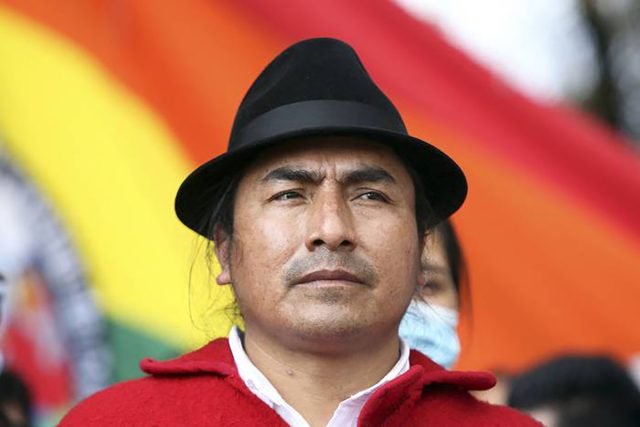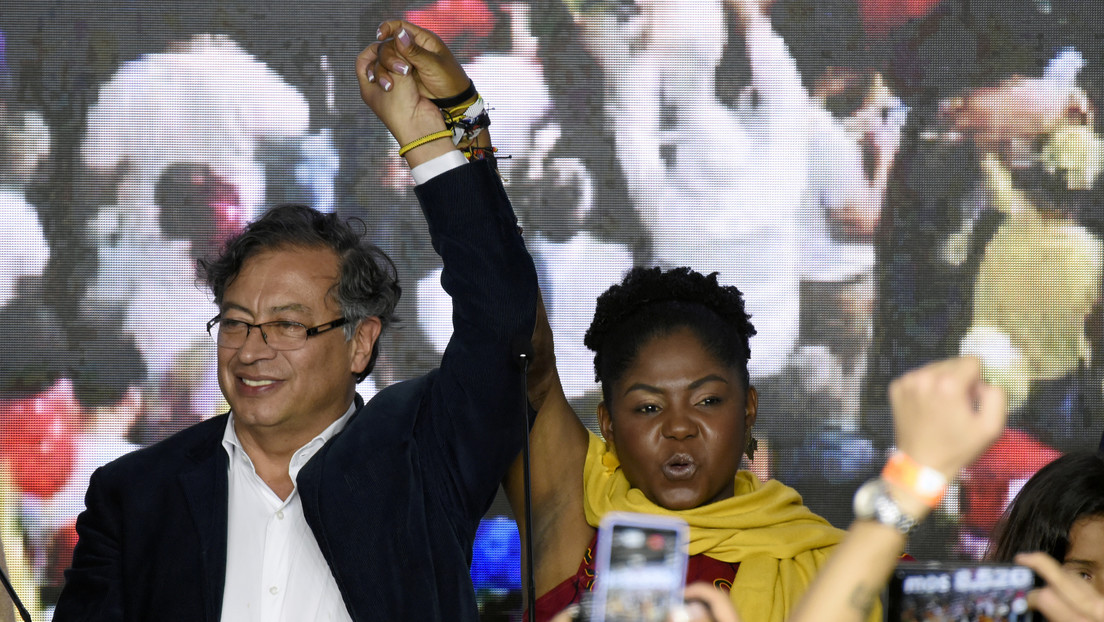Since last Monday, June 13, Ecuador has been experiencing a national strike that was called by the Confederation of Indigenous Nationalities of Ecuador (Conaie) and to which trade unions, student, and human rights organizations, among others, have joined.
Conaie is led by Leonidas Iza, who was elected to preside over the organization in June 2021, for a period that runs until 2024.
In the voting that took place in the VII Conaie Congress, Iza was the most voted candidate, reaching 821 votes; compared to the 287 obtained by María Andrade, from the Saraguro people, and the 153 obtained by Marco Guatemal, from the indigenous communities of the Sierra Norte, explains the journalist Edgar Romero in an article by RT.
Leader in the social outbreak in Ecuador
Iza gained national and international notoriety in October 2019, when he was one of the leaders, together with the then president of Conaie Jaime Vargas, of the social outburst that was then experienced against some of the policies of the Government of Lenín Moreno, such as the rise in fuels.
Although the protests – that year – were initiated by transport workers, Conaie took the lead and declared «indefinite mobilization», extending the demonstrations for 11 days, with a concentration in Quito, the country’s capital. The State unleashed a strong repression against that outbreak,which left 11 dead, 1,340 injured – including 11 people who lost an eye – and 1,192 detainees, according to data from the Ombudsman’s Office.
At that time, Iza presided over the Indigenous and Peasant Movement of Cotopaxi (MICC) and, as one of the leaders of the protest, participated in the dialogue that was generated with the Ecuador ian government that achieved the end of the social outbreak.
In the negotiations he presented several proposals, such as a tax on those who have the most (specifically for fuel), seizure of assets and money from corrupt people and the elimination of lifetime salaries in the public administration.
After his participation in that social outburst, Iza, as well as Vargas, were denounced for allegedly instigating sabotage and terrorism; but both benefited from an amnesty approved by the National Assembly of Ecuador last March.
In January 2020, the Council for Citizen Participation and Social Control (CPCCS) awarded Iza a recognition for «his career on issues of citizen participation, human rights and social organization» in the province of Cotopaxi.
That same year, Iza was considered as a possible pre-candidate for the Presidency of the country within the Pachakutik Plurinational Unity Movement, the political arm of Conaie; however, the organization opted for Yaku Pérez, who came in third place in the first round of the presidential elections, held on February 7, 2021, so he did not advance to the ballot.
The run-ins with Lasso
In June 2021, shortly before Iza began to preside over the Conaie, the MICC, led by this indigenous leader, organized one of the first protests against the administration of Guillermo Lasso, who had taken office as president of the country on the 24th. of May.
Then, the MICC delivered a list of requests to the Executive, which included the repeal of the decrees that produce the increase in fuels, that a one-year moratorium be declared on the credits that farmers and small producers have acquired with banking entities, that fair prices be set for the products of the peasants, ensure access to education in the rural sectors of the country at all levels, immediate cessation of mining and oil exploitation in the territories of the peoples and nationalities, among others.
In August 2021, when Iza was already in charge of Conaie, the organization formally delivered to the Presidency of the Republic a list of demands and proposals to mitigate the economic and fiscal crisis facing the country.
On October 4, a first dialogue was held at the Carondelet Palace, seat of the Ecuadorian Executive, in which the indigenous ratified their demands, but left without any agreement. «Of the issues raised, especially on the issue of fuel, there is no opening from the President of the Republic», said Iza at that time.
On November 10, a second meeting took place. From the Executive, the then Minister of Government, Alexandra Vela, pointed out that they had «three coincidences» among six points raised; while Iza, for his part, commented that «there is a lot of progress, but there are no agreements».
At the end of November, the Conaie decided not to return to the dialogue tables with the Executive, due to the president’s lack of response to the meetings held previously. «We will not return to any dialogue process that does not have results,» Iza said at the time.
Then came accusations from each side. In December, Lasso dedicated a few words to Iza. After calling the head of the Conaie an «anarchist», the Ecuadorian president warned he would confront him «with all the power of the State, with all the public force»; and he added that “those who want to anarchize this country, interrupt public services and deepen an economic crisis, already affected by the pandemic”, must end up “with their bones in jail”.
Iza’s response was not long in coming: «President of the Republic, do not have that fascist attitude; this simply demonstrates your inability to solve the problems of Ecuadorians”.
In January of this year, Lasso accused Iza of being «violent» and of wanting to «overthrow» the government; He also assured that he «does not believe in the State» and called him «an enemy of democracy».
«We will confront the violent ones who want to overthrow the government and overthrow democracy, like Mr. Leonidas Iza», the president reiterated.
In the reply, the head of the Conaie said that «tax evaders are violent» and that «being an enemy of democracy is not been able to take responsibility for the Pandora Papers», in relation to the leak made by the International Consortium of Journalists of Investigation (ICIJ), which indicates that the Ecuadorian president had links with 10 offshore companies and trusts in Panama and in the states of South Dakota and Delaware, in the US.
Detentions during the National Strike in Ecuador
Thus, after these verbal confrontations, the national strike began last Monday, in which the Conaie ratified its demands to the Executive, in a list of 10 petitions.
Starting the second day of the strike, Iza was arrested while he was in the Lasso sector, near Pastocalle, in Cotopaxi, in the center of the country.
That heated up the social and political climate and from the Conaie, which described the arrest as «illegal and arbitrary», they called to «radicalize» the protest.
Within 24 hours of the arrest, Iza was released on parole. A judge imposed precautionary measures on him, consisting of the prohibition to leave the country and the obligation to appear before the Prosecutor’s Office on Wednesdays and Fridays during working hours.
“I have regained my freedom under due process. I haven’t escaped», Iza said after being released; and, he sent a direct message to President Lasso: «It is absolutely clear that there is political pressure directed by you», against the social movement.
After that hearing, in which he was released, there was another on the same Wednesday, on a ‘habeas corpus’ requested by Iza’s defense, but the appeal was denied.
In a speech, Iza ratified the indefinite nature of the national strike. «As long as the problems are not resolved, we will continue to sustain this fight», he said.



